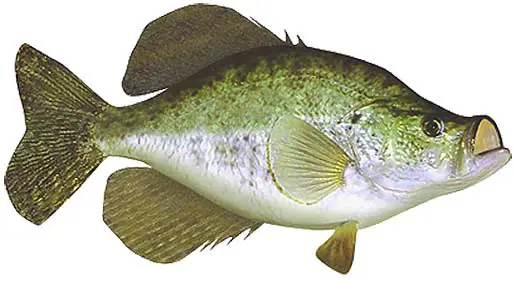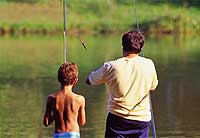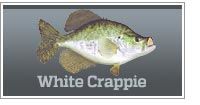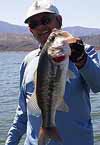Fishing For White Crappie
A beginners guide to catching white crappie
By Rick Seaman
Nov 7, 2024
Tips For White Crappie Fishing
- Basic White Crappie Fishing Tackle
- White Crappie Fishing Video
- Crappie Lures For Beginners
- Top 3 Tips For Beginners
- Crappie Tackle For Intermediate Anglers
- Additional Lures For Intermediate Anglers
- Top Tips For Intermediate Anglers
- World Record White Crappie
- Advice For Serious White Crappie Fishing Enthusiasts

Beginners
White crappie fishing for beginners and novice anglers. Includes tips which can be used while fishing from a boat or while fishing from the bank.
Basic Crappie Tackle For Beginners
 Rod. Start with a 5' 6" to 5' 10", light action rod, with a fast-action tip.
Rod. Start with a 5' 6" to 5' 10", light action rod, with a fast-action tip.
Reel. Spinning reels work best for the vast majority of crappie fishing conditions. Get a good reel with a good drag system.
Line. Begin with 6# to 8# monofilament line. Pay a little extra and get decent quality line.
Method. Cast to likely areas using a bobber to set the depth of the bait. Occasionally move the bobber a few inches and let it set.
White crappie fishing basics video
Basic Lures For Beginners
Crappie Jigs. Small jig heads with a variety of plastics, that represent minnows, can be used in most any crappie fishing situations. Start with a 1/16 oz to 1/8 oz jighead. Sharp hooks are important, check them often.
3 Important Tips For Beginners
Tip 1. White crappie prefer to hang around brushy or wood cover. Look for areas with standing trees, lay-downs or brush.
Tip 2. Thoroughly fish the area with multiple, accurate casts - both near the brush, and a few feet away. Once you catch a crappie, it is highly likely there are more in that area. This is best accomplished from a boat, however can be done from shore for those who like to adventure out along the shore.
Tip 3. Use good knots and re-tie anytime the knot or line has been nicked or frayed. Always use sharp hooks, if they are dull replace or sharpen them
Intermediate Anglers
Crappie Tackle For Intermediate Anglers
 Rods. For longer casts, choose a 6' or longer, light or medium action rod, preferably with a fast-action tip. Shimano, Bass Pro Shops, G. Loomis, Fenwick, Lew's and Abu Garcia, among others, all make a variety of quality rods in varying price ranges.
Rods. For longer casts, choose a 6' or longer, light or medium action rod, preferably with a fast-action tip. Shimano, Bass Pro Shops, G. Loomis, Fenwick, Lew's and Abu Garcia, among others, all make a variety of quality rods in varying price ranges.
Reels. Possibly upgrade to a higher quality spinning reel. Shimano, Abu Garcia, Lew's Mach, Bass Pro Shops Johnny Morris Series and Daiwa are all good choices, and there are many others. Accurate casts are crucial to success.
Line. Line choices include monofilament or fluorocarbon line. Braided line with a monofilament or fluorocarbon tip can be an ideal setup for crappie fishing. Use an alberto or albright knot to join lines. Monofilament or fluorocarbon in 6# to 8# line is a good choice. In open water, 4# line may produce more bites, especially from the larger fish in the school.
Basic Lures For Intermediate Anglers
In addition to crappie jigs, learning to use the following baits can improve your chances for success.
Drop Shot Rigs. A wide variety of worms and baitfish-imitating plastics can be fished for spots, especially in deeper water.
Live Bait. Minnows, crickets, grass hoppers and other small critters can all catch crappie.
Techniques. Try casting and retrieving, without a bobber, and slowly reel the bait back to you. From a boat, use the electric trolling motor to slow-troll the crappie jig, varying the speed until you identify the best speed. Start at about 1 mile per hour and experiment with faster or slower rates.
5 Important Tips For Intermediate Anglers
Fishing Reports. Read current fishing reports and crappie tournament results from the lake you wish to fish, also review these reports and results from this time last year. Learn how to gain maximum knowledge from fishing reports.
Lake Maps. Contour maps identify creek channels, flats, and depth variations. This information can help you plan your time on the water, well before you head to the lake.
Focus On Finding The Fish. White crappie move up and down in the water column in search of the best available water temperatures, availability of food, and a variety of other factors. Begin the day fishing shallow, medium and deep water in search of the best depth for the day. Crappie also migrate throughout the lake. following baitfish. Fish around brush and wood out on points, back in coves, and on ledges in open water. Once you locate fish, concentrate on that depth and similar locations.
Keep Lure Selection Simple. White crappie are not as picky as we tend to think. Stick to basic colors as long as they are biting, then experiment with brighter color options. Depending on water clarity contrast may be an issue dictating dark or flashy colors.
Use Multiple Baits. Once you locate an area holding crappie, try a variety of jigs and/or live bait, to see which entices more bites. For each bait vary the speed and action of the retrieve to determine the best approach for getting bites
Experienced Anglers
Advice For Serious White Crappie Fishing Enthusiasts
Study the life cycle of white crappie, their annual migrations, daily movements, and food sources available in the lake you plan to fish. Our focus here is to assist beginner and intermediate anglers. For those wishing to take the next step, there are a multitude of options for growing your knowledge of fishing for white crappie.
Crappie Fishing Clubs & Tournaments. You can join and participate, with or without a boat, and learn from some of the better anglers in your area.
Time On The Water. Experience is the best teacher. Spend time locating the fish and experimenting with a wide variety of lures and techniques.
Gather Information Online. Read information on your local Fish & Game Department website. Review websites offered by expert crappie anglers, fishing organizations and local fishing guides. Some highly regarded websites covering white crappie fishing include How To Catch Crappie, Bass Pro Shops 1Source, and The Angler Wiki.
Have Fun. Fishing for white crappie can be very rewarding. Be diligent, but enjoy the process. Fishing is a life-long journey, and you can learn something new every day you spend on the lake!

world record: 5 pounds, 3 ounces
 Rick Seaman is a fishing enthusiast with over five decades of fishing experience, a retired tournament fisherman, author of numerous published articles on fishing, and co-author of the book "Bass Fishing - It's not WHAT you throw, It's WHERE you throw it".
Rick Seaman is a fishing enthusiast with over five decades of fishing experience, a retired tournament fisherman, author of numerous published articles on fishing, and co-author of the book "Bass Fishing - It's not WHAT you throw, It's WHERE you throw it".
Related Articles
Find crappie waters by state
021826
Fishing Information


